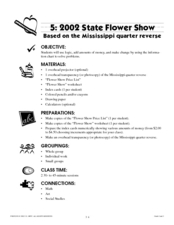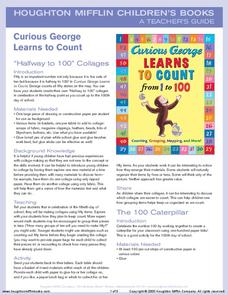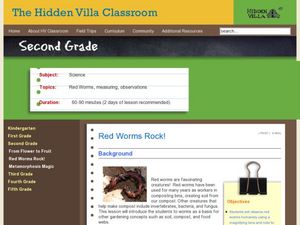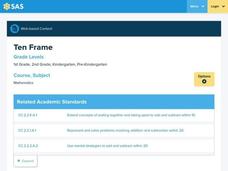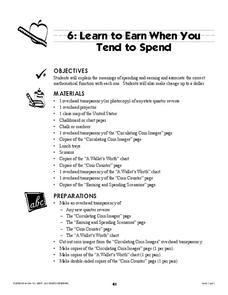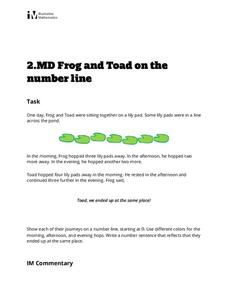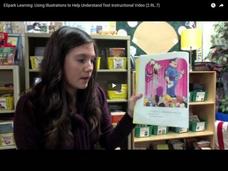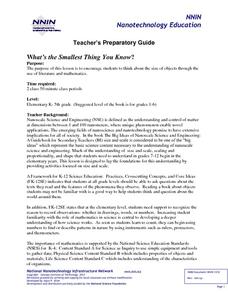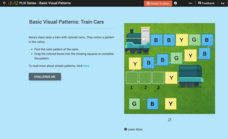Curated OER
2002 State Flower Show
Here is another State Quarter lesson. This one uses the Mississippi State Quarter. Pupils utilize beautifully-designed worksheets embedded in the plan, to practice calculating which combinations of flowers they can afford to buy. They...
Houghton Mifflin Harcourt
Curious George Learns to Count
The magic number is 100. A collection of fun activities, this guide provides educators with ideas for young mathematicians to practice counting to 100.
Curated OER
Properties of Polygons, Parallel Sides, and Right Angles
Have fun with shapes! Third graders read a set of instructions and circle the shape in the description. They work on recognizing parallel sides and right sides. Use this resource as homework after your geometry lesson.
Curated OER
Reading Tally Chart
As learners explore data analysis have them practice reading tally charts using these examples. They answer basic questions about each of three charts, employing addition and subtraction skills. For example, a chart tallying t-shirts...
Curated OER
Square Numbers
Introduce your third graders to multiplication with a worksheet on square numbers. An example demonstrates how to use dots to reinforce multiplication skills. They solve different problems, ranging from 3x3 to 10x10. A great homework...
Teachers.net
Gingerbread Man Glyph from Mailbox Magazine
Follow crafty glyphs to create a one-of-a kind gingerbread man based on personal information such as the color of eyes, number of siblings, and more!
Curated OER
Stamping Coins
Learners demonstrate that they can use a variety of coin combinations to make a single amount. They study all the ways to make 50 cents using coins using different coins.
Ohio Department of Education
Describing and Creating Plane Figures - Grade One
Young mathematicians draw, create, and describe different shapes using triangles. They discuss attributes of the original and created shapes. Pupils classify the created shapes and draw and write in mathematics journals to communicate...
Curated OER
What's in the Bag?
Help your students identify the attributes of two-dimensional shapes. They read the book Round is a Mooncake, and use pattern blocks to sort shapes. Students sort shapes according to their attributes.
Curated OER
Build a Bar Graph
Learners discover how to use bar graphs. They will gather and organize specific data in order to put it into a bar graph. Then they will answer several questions based on the information they have graphed.
Curated OER
Red Worms Rock!
Second graders measure red worms. In this lesson plan, 2nd graders observe and collect data on red worms. Students measure the red worms and create a graph with the data they collect.
Curated OER
Ten Frame
Students add numbers to ten. In this addition to ten lesson, students play the Ten frame interactive game to learn about addition and facts to number ten.
Curated OER
Learn to Earn When you Tend to Spend
Analyzing and understanding word problems is extremely important. Pupils learn that in money problems, earn usually means you add and spend usually means you subtract. They will solve a series of money-related word problems, label coins,...
K12 Reader
Classifying Triangles
Bring math and reading informational text together with a reading comprehension lesson. After kids read about isosceles, scalene, and equilateral triangles, they answer five comprehension questions to demonstrate how they can use context...
American Library Association
Even and Odd Numbers: Lesson Plans and Sample Problems
If your youngsters are new to numbers, here are several interactive strategies to get them thinking about even and odd numbers. For example, they can count the number of desks, people, etc. in the room and determine if it is even or odd....
Illustrative Mathematics
Frog and Toad on the Number Line
Administer a learning activity that challenges your class to use a number line in the form of lily pads. Learners are instructed to display the number of hops that Toad and Frog take during their journey on a number line. Young...
Software Smoothie
Imagination Box - Colors, Shapes, Numbers and Letters
This app provides young learners with opportunities to be creative while they work with different colors, letters, numbers, and shapes.
National Nanotechnology Infrastructure Network
What’s the Smallest Thing You Know?
Elementary learners listen to a story, then sort objects from largest to smallest at six different stations around the classroom. Adaptable for a large range of age and ability groups.
Curated OER
Susan's Choice
Young economists explore opportunity cost by counting how much money Susan has in her piggy bank. From here, they are challenged to help Susan make a choice about what she can buy with her money.
Space Awareness
What is Time?
Does it ever seem like time is slipping through your fingers? Model the passing of time with an hourglass activity in which individuals determine whether hourglasses are the most efficient way to measure time.
CK-12 Foundation
Basic Visual Patterns: Train Cars
An interactive comprised of five questions challenges young scholars to complete a simple pattern. After examining a train with colored carts, learners arrange a green, blue, and yellow block into their corresponding space. Questions are...
Curated OER
Where Are the Dinosaurs?
Students explore the concept of extinction by studying dinosaurs. For this dinosaur lesson, students distinguish between extinct creatures and those that still exist.
NASA
Solar System Scale & Size
Use a variety of whole fruits to represent the different planets in the solar system to introduce scale sizes to your math or space science class. They follow suit by creating a non-scaled model of the solar system using specific-colored...
Curated OER
Multiplication Stories
Second graders solve various multiplication math word problems involving cars and people, fish and fish bowls, and tables and table legs. They write and solve multiplication story problems related to whole numbers, addition, subtraction,...
Other popular searches
- Concept Formation Math
- Concept Formation Math 1st
- Concept Formation Math 2nd
- Concept Formation Math 3rd


